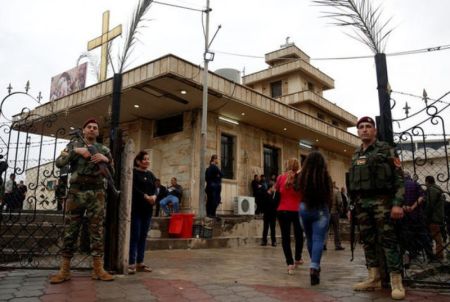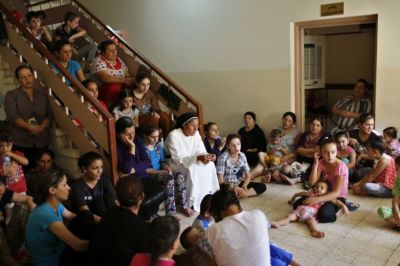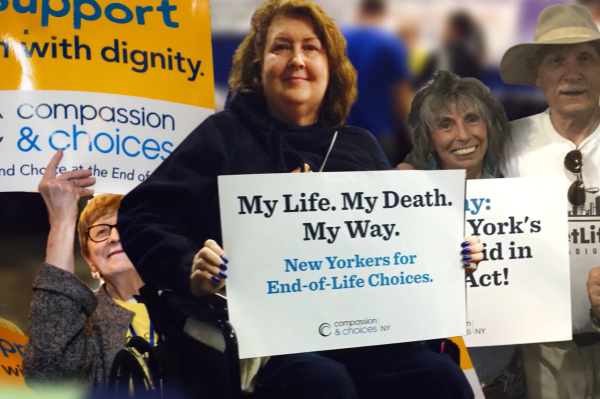Trump Making Situation 'Worse' for Iraqi Christians by Continuing Obama's Policies: Nina Shea

Iraqi Christian communities are in dire need of humanitarian and reconstruction assistance as they continue to receive a minimal amount of aid from the U.S., and as Iranian-backed militias and Shiite Muslims have moved into villages and towns where Christians once lived, a prominent human rights activist has warned.
As their population continues to dwindle, Iraqi Christians are struggling to rebuild in the aftermath of the Islamic State and are getting little to no help from the U.S. and the Trump administration.
Although Congress passed the Consolidated Appropriations Act of 2017 earlier this year that said persecuted religious minorities in Iraq have access to U.S. humanitarian aid, religious minorities like Christians and Yazidis are still having trouble accessing any aid funding.
"That Consolidated Appropriations Act has essentially been ignored by the State Department," Nina Shea, who served for 12 years on the U.S. International Commission on International Religious Freedom and a prominent human rights lawyer, told The Christian Post this week.
As the Christian population in Iraq has decreased from over 1.4 million to less than 250,000 in the last 15 years, Shea, the director of Hudson Institute's Center for Religious Freedom, wrote an op-led last week arguing that "the Trump administration is "making the situation worse by continuing Obama policies that effectively exclude these non-Muslims from U.S. aid in Iraq."

Although the U.S. has provided over $1.4 billion in humanitarian aid to Iraq and over $250 million in reconstruction aid, very little of that funding has been used to benefit Christian and Yazidi communities due to a U.S. policy that requires aid money for Iraq to be funneled through the United Nations and U.N. displacement camps. Christians and other religious minorities are afraid to go to U.N. camps out of fear of persecution from Muslims.
"[W]e remain deeply concerned that the American government has still directed little or no aid to the Christian community in Iraq despite its clear declaration that genocide was committed by ISIS against that Christian community," Archdiocese of Erbil's General Counsel Stephen Rasche said in a statement shared with CP.
"President Trump has promised to aid the victims of ISIS' genocide and Congress has placed a statutory obligation on the State Department and USAID to do so within FY 2017, which ends in just a few days. We urge these government agencies to make good on President Trump's promise and to immediately assist the Christian, Yazidi and other religious minority victims of genocide in Iraq."
While Christians and other religious minorities in Iraq struggle to get aid and assistance from the U.S. government, the State Department announced last week that it was giving $32 million in humanitarian aid funding to help Rohingya Muslim refugees in Myanmar.
Although she has no problem with the U.S. providing aid to the refugees in Myanmar, Shea said she wonders why it's taking the State Department so long to provide such aid to religious minority communities in Iraq, considering the agency showed the ability to act quickly in "responding to headlines" about the plight of the minority group in Burma.
"I don't think there is any rational explanation. I just think, again, we are seeing some of the Obama people re-appointed and some are just there carrying out these policies. Some of them are foreign service people who have no clue of what is going on," Shea surmised. "Part of it is that you don't have the political appointees in influence, in the mid-range, and the top-level people for some reason are not responding."
In an emailed response to CP, a State Department official said: "Any assertion that the U.S. is not providing support to vulnerable communities in Iraq is false. Since FY 2014, the U.S. government has provided nearly $1.7 billion to address the humanitarian needs of Iraqis both inside Iraq and in the region, including vulnerable members of minority communities, like the Yazidis and Christians. This includes an additional $264 million announced on Sept. 20. In addition, we have provided $115 million, with more pledged, to the successful U.N. DP Funding Facility for Stabilization. This has resulted in 2.2 million Iraqis returning to their homes. A sizable proportion of this assistance is in minority communities.
The official added, "U.S. humanitarian assistance is offered on the basis of need, rather than religious affiliation, but minorities are among the principal beneficiaries. Humanitarian assistance is provided to both internally displaced persons (IDPs) in camps, and to IDPs living in communities — often with families."
Shea said that the U.N. has refused to give money to churches in Kurdistan that have been sheltering thousands of refugees who've stayed out of U.N. camps. She said that she was told by the Chaldean Archbishop of Erbil Bashar Warda that the archdiocese spends about "$800,000 per month just to feed" the displaced, not including the costs to shelter or medicine.
"They can't get out from under that humanitarian aid to help people resettle and go back and build houses," Shea said.
Although humanitarian aid organizations like the Knights of Columbus, Samaritan's Purse and others have donated millions to help rebuild Christian homes in the Nineveh Plains, there is still a large need for funding to help Christian towns and villages rebuild infrastructure, restore power and restore plumbing.
According to Shea, the U.N. has provided very little substantive help to restore Christian towns. Although the U.N. has carried out some small projects in Christian towns, Shea asserts that those projects are only "cosmetic" and won't entice Christians to return.
"In Bartella, we are funding through the U.N. the repair of a canopy on a municipal building. Then, there is another project there — a repair on the mayor's office. These are not going to be the kinds of projects that draw families and make them want to stay with everything in rubble in their town, and there is no water and electricity in their town," Shea stressed, comparing the situation to going into hurricane-ravaged Puerto Rico and only repairing a canopy on a government building when the whole island is without power.
According to Shea, Christian leaders don't have any say when it comes to the U.N. task force that decides which projects to do in the Nineveh Plains.
"These people are so needy, they need everything. No one is really listening to them," Shea told CP.
She warned that the U.S. should really be bothered by the fact that "Iran is aggressively establishing schools and mosques and libraries and other structures within the main Christian towns."
"What Iran does is give money to the Shiite majority and they buy the Christian's land," she added. "The Christians feel like they have no hope of getting back and they are intimidated by the Iranian militias in their towns and they sell out."
"[Christians] are losing heart," Shea stressed. "They are on the brink of extinction and they are seeing Iran move in."





















